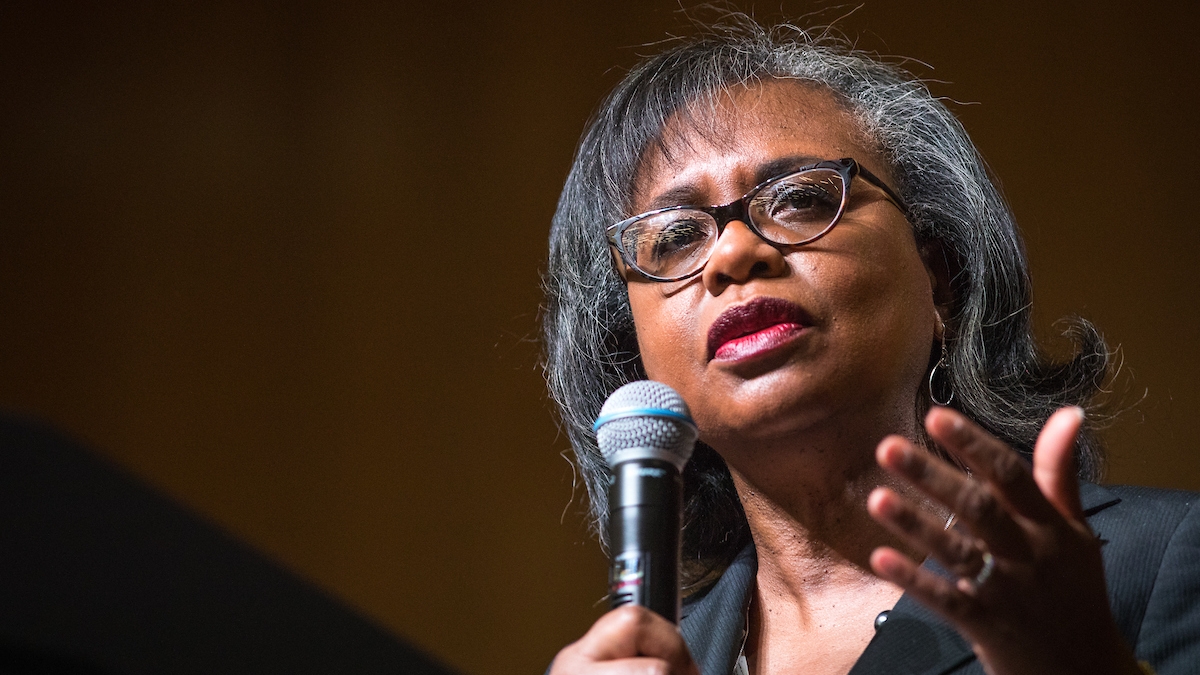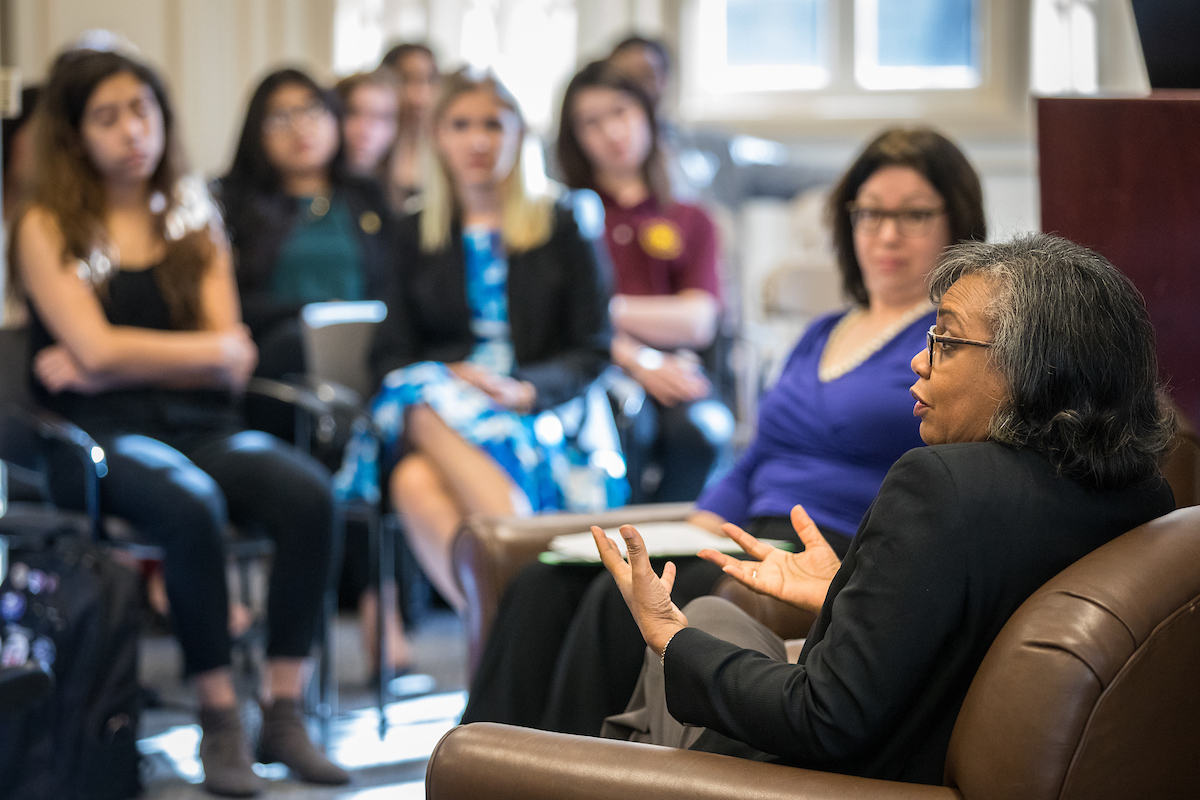Anita Hill delivers powerful testimony at John P. Frank Memorial Lecture

Civil rights advocate and law professor Anita Hill said Monday that while women are currently experiencing "a movement” and moving the needle on sexual harassment, it hasn’t happened quickly enough and there’s still more work to be done.
“This attention is long overdue and this is a moment where we can still get change if we use our voices,” Hill said. “There is a new urgency and need. ... We can take this movement and make it one for change that can be institutionalized in ways so that in 20 years we won't have to say, ‘Where did we go wrong?’ or ‘Why didn’t we do more?’
"I am impatient and I hope you are all, too."
Hill, 61, was this year’s guest for the John P. Frank Memorial Lecture, hosted by ASU’s School of Social Transformation.
The John P. Frank Lecture is the school’s signature event. The endowed lecture series honors the memory of John P. Frank (1917-2002), a leader in the Arizona legal community who is recognized as part of the team that represented Ernesto Miranda before the U.S. Supreme Court in 1966 — the case in which the high court ruled that suspects must be advised of their right to legal counsel.
Frank also served as a legal adviser to Hill when she testified in October 1991 during confirmation hearings for Supreme Court Justice Clarence Thomas.
“The demand and interest for this appearance is great. There’s a generation, including my own, that remembers Anita Hill from her courageous testimony, demonstrated by speaking up regarding the sexual harassment that she had experienced from now Supreme Court Justice Clarence Thomas,” said Madelaine Adelman, a professor in the School of Transformation who sits on the John P. Frank Lecture selection committee. “It was electrifying, it was depressing, it motivated lots of women to run for office and we’re seeing a really similar pattern with women and some men about their experiences on the job and what has been viewed as normal. It’s an interesting echo from all those years ago.”
Brandeis University Professor Anita Hill speaks with a group of 50 faculty and students Monday, Feb. 5, before giving the 19th annual John P. Frank Memorial Lecture. While answering questions about the #MeToo and #TimesUp movements, she suggested to be aware and anticipate the next wave of sexual harassment, and other ways that people disadvantage others — sexually, gender-wise and economically. Photo by Charlie Leight/ASU Now
Hill became a national figure when she testified before the Senate Judiciary Committee during Thomas’s 1991 confirmation hearings. Hill, an African-American law professor at Brandeis University in Boston, testified under oath for nine hours before an all-male panel that she was sexually harassed by Thomas while under his employ at the Department of Education. Thomas denied the allegations and called the hearings a “high-tech lynching.” Despite Hill’s pointed testimony, days later Thomas was confirmed as a justice.
However, Hill’s testimony opened a door for the feminist movement. Sexual harassment and abuse claims to the Equal Opportunity Office doubled, and awareness of sexual misconduct in the workplace received more media and government attention.
Past John P. Frank lecturers include Sonia Sotomayor, associate justice of the Supreme Court of the United States; Nina Totenberg, legal affairs correspondent for National Public Radio; and Jose Antonio Vargas, journalist, filmmaker and activist.
About 800 people attended the lecture at ASU’s Student Pavilion on the Tempe campus.
Former Arizona Governor Janet Napolitano and U.S. Secretary of Homeland Security and the current president of the University of California system, introduced Hill to audience members.
“I will never forget the image of Anita Hill seated alone at the witness table as she faced a panel of skeptical, stone-faced men,” said Napolitano, who was enlisted by Frank to serve on his legal team at the time of Hill’s testimony. “Her words opened peoples’ eyes to the damaging effects of sexual harassment and paved the way for future change. Anita Hill’s words have not only endured, (they have) grown.”
Napolitano also noted Hill’s legacy, calling her a “tireless champion of civil rights and equality for women, girls and people of color.”
Hill’s lecture ranged from race to civil rights, the country’s legal system, the Weinstein scandal, failed leadership, and the current presidential administration. She said sexual harassment and gender equality got swept under the rug for several decades, starting with the civil rights movement of the 1960s. It remained ignored under several presidential administrations, due to shifting public moods and inaction from government to make it public policy.
“The idea of sexual harassment was never part of the government or public agenda,” Hill said. “Most in government thought that this was private behavior … there was never a full public agenda or approach for ending sexual harassment.”
She called her 1991 testimony simply a moment in time, and said she stood on the shoulders of the women of the 1960s, 1970s and 1980s. She said it was they who endured countless acts of sexual extortion, harassment and abuse and “paved the way for where we are today.”
She said today’s current climate of holding workplaces accountable and movements like #MeToo and #TimesUp have been “25 years in the making.”
“I am pleased to say that people underestimated the will of women,” Hill said. “They galvanized themselves and they didn’t wait for the government to say this is a matter of public concern. They made it a matter of public concern … They did it themselves. They’d had enough suffering in silence.”
Hill saved her greatest praise for Frank, saying he came along at a pivotal moment in her life and was an incredible “legal mind and force.”
“He (Frank) made me believe that what I was doing was worthwhile,” she said. “He reassured me that what I was saying really did matter to the world that we were living in and to the world that we were going to be moving into in the future.”
Top photo: Brandeis University Professor Anita Hill delivers the 19th annual John P. Frank Memorial Lecture in front of 800 people at the Student Pavilion, on Monday, Feb. 5. Photo by Charlie Leight/ASU Now.
More Local, national and global affairs

Arizona PBS is now free to stream for Prime Video viewers in the US
Arizona PBS is now available for streaming on Amazon Prime Video. A new partnership between PBS and Amazon brings the station’s primary, high-definition broadcast channel, along with the 24/7 PBS…

First-ever Taiwan Symposium at Thunderbird celebrates business, cultural connections
The investment by TSMC and other Taiwanese corporations in Arizona will reap dividends not only in thousands of new jobs but also in strengthened cultural connections and new methods of…

Study shows that trust drives successful market economies — but not in the way you may think
From fueling our cars to fulfilling daily coffee habits, the average U.S. cardholder makes 251 credit card transactions per year, according to Capital One.Each of these transactions are built…


